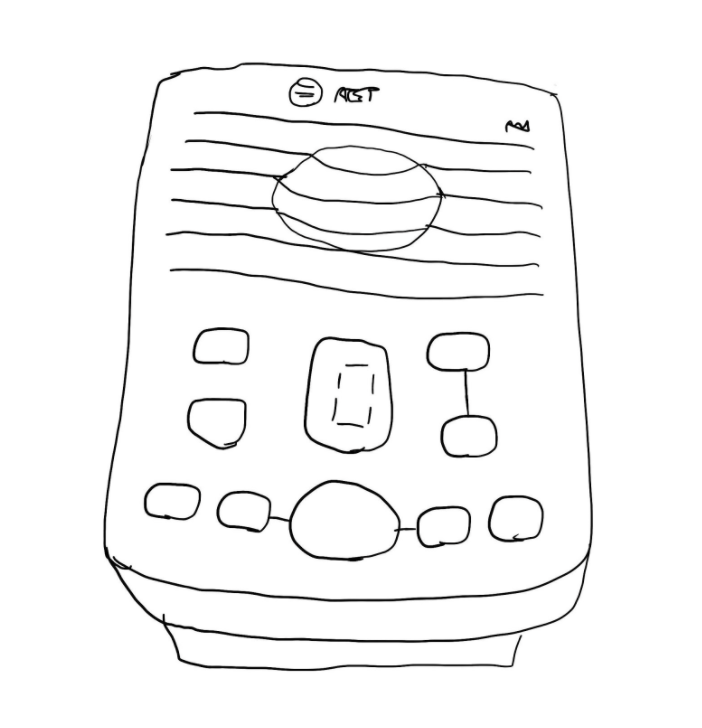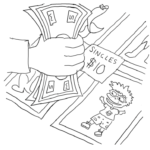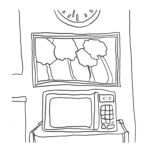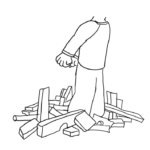
I’ve been writing these essays throughout 2020 and 2021. If you were a kid of any age during that time, you probably heard this a lot:
You’re living through history.
Which is true. The year we’ve been in – 2020/1 – will change the world forever. Your 2020/1 TikToks were all primary sources in the making. (Hope you like them!).
Adults like to talk about living through history. We like to recall the terrific and terrible moments that defined our generation. My mother talks about two of these moments. Terrific: a July afternoon in 1969, when she sat on the living room floor, inches from the TV, watching the moon landing with her father. Terrible: a late November morning in 1963, when she got sent home early from second grade because the President had been shot.
But when adults talk about living through history, I find that our stories are somehow personalized yet impersonal. At first, our stories are our own: we talk about where we were, what we were doing, who we were with. But soon, we leave ourselves behind. We turn to big, intellectual, and abstract things. Like politics and society and culture.
Don’t get me wrong: discussions about politics and society and culture aren’t bad. On the contrary, they’re essential. But sometimes, I wish we adults talked about history in smaller ways, too. Because living through history doesn’t always feel big and intellectual and abstract, especially when you’re young. Sometimes, the changes you grapple with first aren’t social or cultural or political. They’re deeply and strangely personal. And if we only talk about history in big ways, it can feel wrong, guilty, and weird for feeling like a person, for thinking about yourself, when all this history is happening around you.
That’s how I felt, when I lived through history the first time, in September 2001.
***
I was in sophomore Latin, working on a two-line translation. This was a routine exercise. I used a black pen to copy Latin sentences onto loose-leaf paper, skipping every other line. Then I went back, switched to blue pen, and filled in the empty spaces with English words.
Mrs. H, my teacher, whose passion for antiquity was endearing, if not contagious, swore by this two-line method.
I remember that I was working with one of Pliny’s letters. I’ve wondered if it was his letter to Tacitus, regarding the death of his uncle.
Ut populi ut urbes memorabili casu.
“As did populations, as did cities, because of an unforgettable disaster.”
A woman I did not know opened Mrs. H’s door and called her into the hallway. We kept translating, switching pens, whispering about Dawson’s Creek and datives of possession and how much homework we had. I was hungry, already, for my half-turkey sandwich.
Mrs. H returned, clearly startled. She closed the door behind her. “Class,” she said, with a quake in her voice. “Stop your translations for a second.”
We looked up at her.
“Something … concerning has happened.”
Her eyes darted across us.
“A plane has crashed into one of the Twin Towers.”
That did sound concerning. The Twin Towers were very tall, very famous buildings of the New York Skyline. A plane crashing into them seemed… well, really bad. But at first, I didn’t understand how bad the situation really was. I did not think a lot about planes and towers. And maybe because I was young, or sheltered, or an optimist, or all those things, my first visualization of Mrs. H’s words were pretty tame. I pictured an off-course jet from JFK, accidentally grazing into one of the antennae on top of the buildings. A bad accident. I did not, perhaps could not, imagine a full-on collision, nor a total collapse, nor intentional terror.
Some of my classmates pressed Mrs. H for details. When? Which tower? Were people hurt? Had the plane crashed? Exploded? Was it an attack?
Their questions woke me up.
Mrs. H asked everyone to stop asking. “I really don’t know any more than I’ve told you,” she said. “I’m sorry.”
“Can we turn on the news?” someone begged, pointing to the old TV set hanging in the corner of our basement classroom.
“No,” Mrs. H answered. “Right now, the instructions are to continue as normal. Until we get further updates.”
She took a breath.
“So, please get back to your translations.”
She turned toward the board.
“I’m sorry,” she added.
Keep in mind, this was a time before smartphones. We really couldn’t do much else to figure out what was happening. So, I was fine to translate. I uncapped my black pen and mindlessly copied Latin sentences, for now empty of meaning, onto my paper. I skipped every other line. I tried not to think about what might be happening in the city, where my mother worked.
***
The second plane hit as we were changing classes. I was climbing four flights of stairs, from Latin with Mrs. H to AP European History with Dr. R. The stairwell was tense. On each landing, two or three kids cowered with their cell phones, fingers pressed against their opposite ears, trying desperately to hear whoever was on the other end. I picked up phrases as I climbed. Though I couldn’t tell exactly what was going on, I did realize that my early interpretations of Mrs. H’s announcement had been misguided. This was, I gathered, a really, really bad situation. I wanted to call my mother.
We were not supposed to use cell phones during the school day. Though I had seen plenty of rule-breakers on the staircase, I still thought I should ask Dr. R’s permission. I was confident that, under the circumstances, he would allow it. When I reached the AP Euro room, high on the third floor, he was standing in the door frame.
I greeted Dr. R, a bit winded from the staircase. And from everything else.
I asked: “Can I try to call my mother, before class starts?”
“No,” said Dr. R, smiling but firm.
No?
He gestured toward my desk, and I entered the classroom, out of habit and in disbelief. I took my seat. I swelled with anger: a little at him, but mostly at myself. I should have just called her. Who asks permission at a time like this?
Dr. R closed the door and began one of his famously boring lectures. I jotted the date in the upper right corner of my notebook. 09.11.01.
***
My linear memory of the day stops there. The rest of the moments are clear, sharp, and staccato. They swirl around one another. I will not falsely arrange them for the narrative. I will share what I have:
Amanda finds me by our lockers. She tells me that I should come home with her after school.
I dial my mom’s cell phone many times, in many hallways.
Busy signals.
I leave school.
I walk to Amanda’s house.
The day is bright with a clear sky.
I have two memories of how I learned that my mother survived. I cannot speak to the veracity of either. In one memory, she is already at Amanda’s house by the time we get back from school, sitting on their big, green loveseat, facing the TV but watching nothing, empty and frail. She gets up when I walk in the door, and she hugs me without words.
In the other, Mom isn’t at Amanda’s house when we arrive from school. Dee, Amanda’s mother, my second mother, rushes in from the kitchen. She tells me that my mother has called their landline; that she is fine; that she left Manhattan by walking over some bridge. Now she is in Queens, trying to get a taxi back home. Eventually, she walks through the door, and I get up from the big green loveseat, and we hug, and she sits down after, still frail with an empty gaze.
All I can say about those hours, for sure, is that after I got angry at Dr. R, I went numb. The world felt underwater, slow and opaque. I was there for it all, yet I wasn’t, which is maybe why I don’t remember things in order, or why I remember the most important things two ways at once.
***
My memory picks up with certainty when I’m back home. My mother is in the shower, and I notice that our answering machine is blinking red. (Answering machines were like old-school voicemail boxes. They sat near your phone, and they recorded people’s messages when you weren’t home. Sounds crazy, I know, but that’s how things were back then).
The machine flashes a 0, over and over again, not because we have zero messages, but because we have more than 9. I click on the powder blue play button, out of instinct more than curiosity. A lot of people have called to check in. My grandfather. Vicki, my godmother, my mother’s best friend. My mother’s boss.
Then, my mother’s voice comes on the machine.
This moment, I remember, exactly as it was.
“Hi Andy,” she says. “It’s Mom.”
I stare straight at the machine. I should not be hearing this. But it continues.
“Things are not looking too good in the city right now. So I’m calling to tell you how much I love you. Just in case I don’t make it home.”
She pauses.
“You’re the best thing that ever happened to me.”
Beep.
Her message ends. The others play. Our old neighbor, Trish. My grandfather again.
I hear them, but I don’t, frozen at my mother’s good-bye. I live, for an instant, in another timeline; one where she dies, in the city, or on that bridge. I hear this message as it was meant to be heard, not by accident, but by design.
It is unbearably strange and sad, to know how my mother would say good-bye.
I walk away from the answering machine, the messages still playing.
Later that night, I hear my mother checking the machine. When she hears the sound of her voice, she slams on the delete button, erasing the possibility.
But her erasure is partial, at best. I have already heard it, and it has changed me, her message from that day.
***
9/11 changed everything. The tone of my whole world. For me, like many 90s kids, things had been bright and light and optimistic; though I couldn’t see that, or understand it, because there had been no contrasts. Then 9/11 came, and the towers fell on a clear and sunny morning, and everything got darker, forever. What the darkness looked like, what it meant, for each of us – only each of us can say. For me, the meaning of 9/11 was very much about – perhaps only about – my mother. That I almost lost her, and that I didn’t.
After 9/11, I kept death closer. It hummed quietly, under the surface of my daily life, in a way that it had not before. I became older, more grateful, and more scared. I became more human, because my mother called, because the towers fell.
***
You have lived through history. 2020/1 will define your youth, as 9/11 did mine. There are differences, of course. A striking one is that 9/11 was a morning, a singular event, albeit with long and lasting consequences. 2020/1, on the other hand, is a long year. And it’s not one thing. It’s a pandemic, a racial justice movement, an election, an insurrection.
Still, I suspect that 2020/1 might grow you up in some of the same ways 9/11 did me.
After this year, you might keep death a little bit closer. You might feel older, and more grateful, and more scared. You might feel more human: shaken yet strong; sad yet hopeful; lonely, but not alone.
Perhaps that is how all these defining moments define us, in the end. They remind us, within and across generations, of the frail and precious humanity we share.
That is why I wrote this, I think. I want you to know that, when you’re living through history, you might feel more like a human being than a historical agent. You might feel small and scared. You might even feel guilty for feeling that way. For feeling like a person, for thinking about yourself, at a time when the world was changing in big and important ways.
But it’s okay to feel that way. Under history’s heavy weight, under the big talk of politics and society and culture, you still have to be you: to sort your own story, to navigate your own life, to make your own meaning.
Don’t close your eyes to history. Live through it, certainly. Watch it, think about it, learn from it. Take seriously your obligation to make the world a better place. But, through it all, be at peace with your frail and precious humanity. Know that history’s big moments are not only for defining generations, but for shaping, too, every one of our small and worthy lives.



